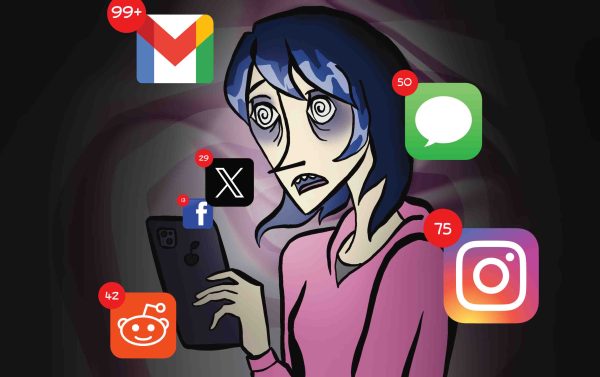
Excessive time on social media can lead to grogginess and mental health issues. Jada Hauser | Washtenaw Voice
Alejandra Smith
Staff Writer
As time passes, we continue to integrate into a digital society that shapes the way we connect, communicate and express ourselves.
The first social media platform to reach a million monthly active users was in 2004, MySpace was the beginning of social media as we know it. Since then, we’ve had Facebook, Instagram, X, Reddit, TikTok and other platforms dominate our devices.
Yet as our screen time continues to rise, now averaging at a staggering seven hours a day according to a 2020 survey conducted by Forbes, concerns about the impact of social media on our mental health have become increasingly prevalent.
Research findings such as articles from HelpGuide.org, the Mayo Clinic, Yale Medicine and more consistently highlight the negative effects of excessive social media use, negatively correlating with feelings of worthlessness and escapism and heightened symptoms of anxiety and depression.
These discoveries are echoed by students like Colin Maynard, a 20-year-old Secondary Education major who shared personal anecdotes of feeling discouraged about life and disconnected from his religion when he uses social media excessively.
Despite these concerning trends, finding solutions to mitigate the negative impacts of social media remains complex.
As Maynard points out, “The first amendment protects freedom of speech,” which makes differentiating misinformation from reality a challenging endeavor.
Nevertheless, some researchers believe that social media platforms can have a positive impact on mental health by connecting people to mental health resources and fostering social connections around the world, reducing loneliness, anxiety and depression.
Tom Zimmerman, an English Professor at WCC, underscored the educational benefits of social media by saying that “social media gives students a wider range of reference.”
“They [students] know about more things with a broader knowledge base. You don’t have to carry an encyclopedia around anymore, you can just open your phone,” he said.
Amidst the potential benefits of the education of social media, concerns about anonymity and the spread of misinformation persist.
Zee Walsh, a 19-year-old Liberal Arts Transfer student, cautions against the dangers of unqualified advice and triggering content.
“Anonymity is powerful, especially with the mental health crisis,” Walsh said. “People promote coping skills that they are not qualified to share, and say things that are more triggering than helpful.”
The influence of excessive social media usage on mental health is nuanced and contains multitudes.
While these platforms offer unprecedented opportunities for intrapersonal communication and learning, they pose significant challenges that must be addressed.
Moving forward, it is essential to continue researching and exploring ways to harness the power of social media while navigating its potential risks, ensuring a healthier digital landscape for all.
